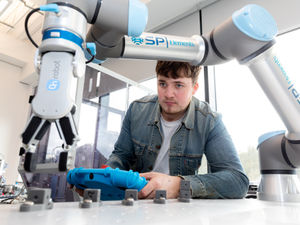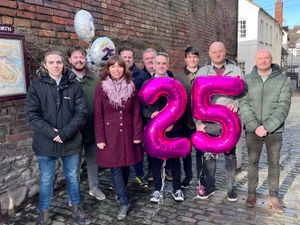Make 2021 year of reshoring urges manufacturing chief
The boss of a Birmingham-based stamping specialist is urging UK companies to make the most of a growing desire to reshore.
Rowan Crozier, chief executive of Brandauer, believes manufacturers have a once in a generation chance to reclaim some of the work that emigrated to low-cost countries during the early 1990s and throughout the 2000s.
A lot of major original equipment manufacturers have been stung by extended supply chains with Covid-19 interruptions creating a ripple effect of production stoppages and cost penalties from not getting product out the door and to market quick enough.
The former engineering graduate, who has led the company to a Queen’s Award for international trade, insists companies, based in the UK and EU, will be more reluctant to place all their work in far-away, lower cost economies, where they could be subject to higher tariffs, quota restrictions and shipping delays.
A reduction in capacity – causing longer raw material lead times from the EU and Asia – will also exacerbate this, as will consumer demand for UK-made products that are more sustainable and friendly to the environment.
There is also a recognition for what the UK is known for, including innovation, science and outstanding research and development.
“This isn’t going to be easy to take advantage of, quite the opposite. However, it is definitely something that manufacturers should be exploring, and Government should be actively backing, whether that is through tailored support, incentives to bring work home or financial support for companies wishing to embark on these types of projects,” explained Mr Crozier, who is also vice chairman of Make UK’s West Midlands Advisory Board.
“We have been very proactive in targeting new opportunities and this approach is already reaping dividends with contracts in the EU zone secured in construction and medical sectors, with our engineers also currently looking at new opportunities with North American customers in automotive electrification, pharma and renewables.”
He continued: “Naturally, when changing the source of supply, it comes with risk. New terms, new relationships, possible R&D investment to make it work and above all will the new supplier live up to its promises and deliver?
“This is where due diligence comes into play and a clear cost/risk benefit analysis must be used to determine whether the advantages of reshoring outweigh the issues of leaving your components where they are.”
Brandauer has embedded standard processes around existing tool transfers and new product introductions that are proven to recognise and manage the risks and provide potential new clients with a clear path to successfully reshore their critical components.
Managing long supply chains to the benefit of its customers is something else it has honed to the changing needs of the 22 countries it currently supplies into. An example of this is having multiple options to purchase non-functional elements of tooling and jigging and/or raw material and bespoke processing equipment on behalf of customers and moving it to the UK.
This means the firm is taking a significant proportion of the risk and headaches on their behalf.
Mr Crozier concluded: “In the UK, we are sometimes a little guilty of underselling our strengths, values and capabilities in manufacturing, but with all that is going on in the world, now is not the time to ignore the first signs of a reshoring trend.
“Instead, we need to get behind it, promote it, explore where we can deliver new competitive advantage and make it happen. Could 2021 be the year of reshoring…why not?”





